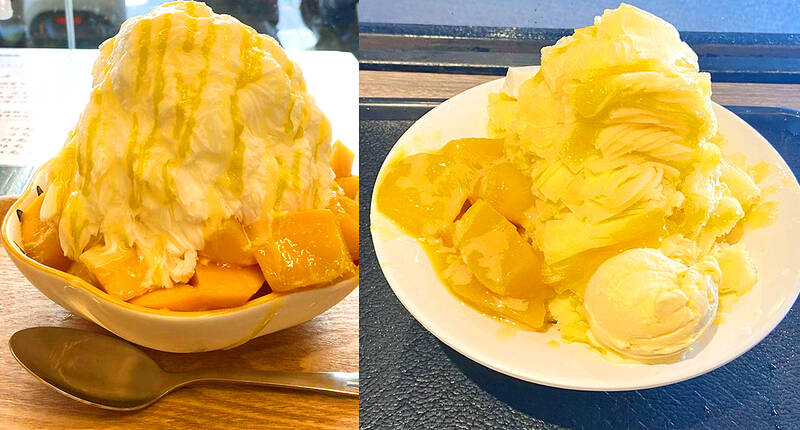Taiwan is hot in the summer, and a popular way to beat the heat is by eating shaved ice, with traditional toppings including adzuki beans, mung beans, tapioca pearls, taro balls and mesona jelly. However, mango shaved ice has in recent years become a favorite among Taiwanese people. Different from classic versions, mango shaved ice features juicy mango chunks on top of the ice, drenched in syrup and condensed milk, and crowned with a scoop of mango or vanilla ice cream. Some shops even add slices of pickled green mango for a sweet and sour taste.
台灣夏季炎熱,吃刨冰即是大家抵擋酷暑的好方法。刨冰經典配料有紅豆、綠豆、粉圓、芋圓、仙草等,但除了傳統刨冰,近年來台灣人也愛吃芒果刨冰。不同於傳統配料,刨冰上放上芒果,淋上糖水和煉乳,頂部再放上一球芒果或香草冰淇淋,有些店家還會放酸酸甜甜的芒果青。
taro ball (n. phr.) 芋圓

Photo courtesy of Bookman l 圖片:書林
mesona jelly (n. phr.) 仙草
condensed milk (n. phr.) 煉乳
vanilla (n.) 香草
Mangoes have a delicate, succulent flesh that is sweet and has a vibrant orange color. When served with shaved ice, it is a popular dessert among locals and tourists in Taiwan, and CNN has recognized it as one of the world’s best desserts. They are in season during the summer, when the days are hot and it’s the perfect time to eat shaved ice. But since the climate of Taiwan remains warm year-round, shaved ice is available at any time. When mango is out of season, other fruits like strawberries and kiwis are also popular options.
芒果果肉呈亮橙色,口感細緻,香甜多汁。芒果刨冰受海內外遊客喜愛,美國有線電視(CNN)還曾將其選為世界上最好吃的甜點之一。芒果產季在夏天,天氣炎熱,正是適合吃冰的時候。不過台灣天氣較溫暖,一年四季都買得到刨冰,產季外草莓、奇異果等水果也是熱門口味。
succulent (adj.) 汁多味美的
strawberry (n.) 草莓
kiwi (n.) 奇異果
However, it is worth mentioning that the ice dessert recommended by CNN is a variation called mango snowflake ice. Both shaved ice and snowflake ice are made with the same ingredients, but the difference lies in the ice itself. Shaved ice is made from water that is frozen into blocks and then shaved into small pieces. In contrast, snowflake ice is mainly made from milk and is shaved into thin, snowflake-like sheets. It instantly melts in your mouth and has a sweet flavor.
不過值得一提的是,CNN 推薦的其實是芒果雪花冰。刨冰和雪花冰的配料相同,不同就在於冰的原料。刨冰的原料即是水,凝結成冰塊後用機器刨碎,雪花冰的冰磚主要原料為牛奶,削成如雪花般的薄片,入口即化,帶有甜味。
Because mango flowers have very little nectar, they cannot attract butterflies and bees to help with pollination. When the mango trees are in bloom, farmers often use odorous substances, such as rotten fish and poultry viscera, to attract flies to pollinate them instead. So, in spring, the areas where mangoes are grown in Taiwan often have an unpleasant smell. This is the price you must pay to enjoy this delicious fruit!
因為芒果花蜜少,無法吸引蝴蝶和蜜蜂授粉,於是芒果開花時果農會用發臭的雜魚及動物內臟等,散發臭味引來蒼蠅授粉。因此每到春季,芒果田總是會發出陣陣惡臭,這就是想吃好吃的芒果必須付出的代價!
nectar (n.) 花蜜
pollination (n.) 授粉
odorous (adj.) 有臭味的
poultry (n.) 家禽
viscera (n.) (複數)內臟
文章由書林出版公司提供:
www.bookman.com.tw

A: When is the Lantern Festival? B: The festival is celebrated on the 15th day of the first month of the lunar calendar, which fell on Feb. 12 this year. A: Oh no! Did I miss the 2025 Taipei Lantern Festival? B: Yes, you did. But you can still go to the 2025 Taiwan Lantern Festival in Taoyuan, which will run until this Sunday. A: Let’s go admire the exuberant lanterns. A: 元宵節到底是哪一天? B: 就是農曆1月15日啊,今年則落在國曆2月12日。 A: 喔不,我是不是錯過了2025台北燈節? B: 是的,但你還可以去桃園的2025台灣燈會,活動將持續至週日。 A: 那我們去欣賞豐富的花燈秀吧! (By Eddy Chang, Taipei Times/台北時報張聖恩)

Every February, the small town of Ptuj in Slovenia comes alive with the vibrant celebration of its famous carnival. This festival, with its deep historical roots, is a cherished tradition where local residents come together to ward off the winter cold and embrace the arrival of spring. Participants dress up in furry costumes, transforming into kurenti, mythical monsters believed to drive away evil spirits and bring good fortune for the new year. Although the exact origins of the Ptuj carnival remain a mystery, it is firmly rooted in ancient Slavic and Illyrian cultures. The modern form of the carnival

A: What’s the theme of the 2025 Taiwan Lantern Festival’s main lantern? B: The theme is “Paradise,” and the main lantern is a snake-shaped “infinity” symbol that features a lighting show every half an hour. A: Cool, I heard that there are over 300 lanterns. B: There are even giant lanterns in the shape of Pikachu and some other popular Pokemon characters. A: Let’s go now. A: 2025台灣燈會主燈的主題是什麼? B: 主題是「無限樂園」!主燈的造型則是蛇形的數學「無限號」,主燈每半小時還有一次燈光秀。 A: 酷喔,聽說總共有300多件花燈作品。 B: 甚至還有皮卡丘和其他熱門寶可夢角色的巨型花燈呢。 A: 哇我們現在就出發吧! (By Eddy Chang, Taipei Times/台北時報張聖恩)

本文由生成式AI協作,本刊編輯編修。 Tucked away in southwestern Taiwan, Yunlin County is a treasure trove of cultural heritage, rich history, and natural beauty. From its stunning temples and glove puppetry to historical architecture and picturesque landscapes, Yunlin rewards those who venture off the beaten path. Yunlin is renowned for its flourishing temple culture. Temples in this region are not merely places of worship but also communal centers where people gather for festivals, rituals, and social functions. One of the most notable temples here is the Beigang Chaotian Temple, which was built more than 300 years ago and is dedicated to Matsu, the sea